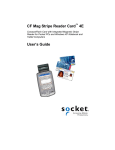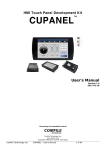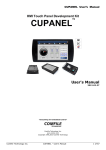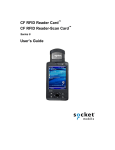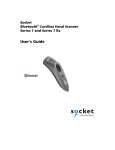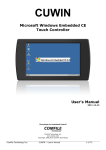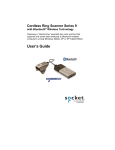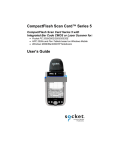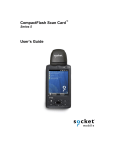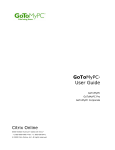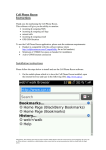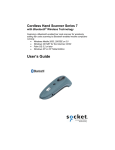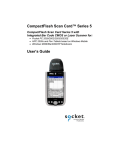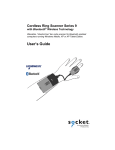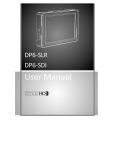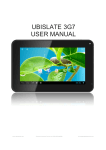Download User Manual - Newegg.com
Transcript
™ CompactFlash Scan Card Series 5 User’s Guide 5/2008 Document # 6410-00166 P Copyright Notice Copyright © 2008 Socket Mobile, Inc. All rights reserved. Socket, the Socket logo and Mobility Friendly are registered trademarks of Socket Mobile, Inc. CF Scan Card and SocketScan are trademarks of Socket Mobile, Inc. All other brand and product names are trademarks of their respective holders. Reproduction of the contents of this manual without the permission of Socket Mobile is expressly prohibited. Please be aware that the products described in this manual may change without notice. The CompactFlash Scan Card includes technology licensed under United States Patent No. 5,902,991 and 7,003,627 Feel free to contact Socket Mobile at: Socket Mobile, Inc. 39700 Eureka Drive Newark, CA 94560-4808 USA Other than the above, Socket Mobile can assume no responsibility for anything resulting from the application of information contained in this manual. Please refrain from any applications of the CF Scan Card that are not described in this manual. Please refrain from disassembling the CF Scan Card. Disassembly of this device will void the product warranty. You can track new product releases, software updates and technical bulletins by visiting Socket’s website at: www.socketmobile.com. 2 Table of Contents COPYRIGHT NOTICE 2 1 | INTRODUCTION ABOUT THE SOFTWARE SYSTEM REQUIREMENTS PACKAGE CONTENTS PRODUCT REGISTRATION 5 5 6 6 6 2 | SETUP FOR WINDOWS MOBILE STEP 1: Uninstall Other Scanning Software STEP 2: Install the Software STEP 3: Insert the Card STEP 4: Assign a Trigger Button STEP 5: Start SocketScan STEP 6: Open Your Application STEP 7: Scan Data into Your Application Symbology Selector Scanner Settings Scan Demo SocketScan Trigger Dual Device Support Special Symbologies 7 8 9 12 13 14 15 15 17 18 20 21 23 23 3 | SETUP FOR WINDOWS XP STEP 1: Uninstall Other Scanning Software STEP 2: Install SocketScan Software STEP 3: Insert the Card STEP 4: Complete the New Hardware Wizard STEP 5: Complete the New Hardware Wizard STEP 6: Assign a Trigger Button STEP 7: Open Your Application STEP 8: Scan Data into a Windows Program Scanner Settings Symbology Selector Floating Trigger Dual Device Support Special Symbologies 24 25 25 27 28 30 31 32 32 34 36 37 38 38 APPENDICES A | PRODUCT SPECIFICATIONS 39 B | BAR CODE LABEL SPECIFICATIONS 42 C | SCANNING TIPS 44 3 D | CLASS 1 VS. CLASS 2 LASER SCANNERS 46 E | DECODE ZONE 49 F | TROUBLESHOOTING 53 G | TECHNICAL SUPPORT 55 LIMITED WARRANTY 56 REGULATORY COMPLIANCE 60 4 1 | INTRODUCTION The CompactFlash Scan Card (CF Scan Card) Series 5 gives you the freedom of scanning bar codes anytime anywhere with a variety of Windowsbased mobile computers. The card’s compact design lets you scan with only one hand when used with a handheld computer. The CF Scan Card is sleekly designed with no cables or batteries and is available in three configurations: • • • • CF Scan Card 5E – Entry Level, CMOS linear (1D) imaging CF Scan Card 5M – Mid-Range, Class 1 Laser CF Scan Card 5P – Performance, Class 2 Laser CF Scan Card 5X – Xtreme Performance, CMOS 2D imaging See Appendix C for a detailed comparison of the two laser classes. ABOUT THE SOFTWARE SocketScan™ enters scanned data directly into any Windows application, as if the data were manually typed. No custom programming is required to use the CF Scan Card. For Windows Mobile, also included is SocketScan Trigger, which places a software trigger on your screen that you can tap to trigger the laser. For software updates, please visit: www.socketmobile.com/support/downloads/datacollection/series5/ CHAPTER 1: INTRODUCTION 5 SYSTEM REQUIREMENTS Your mobile computer should meet these requirements: • Any of the following operating systems: - Windows Mobile 2003SE, 2003 or 5.0 for Pocket PC - Windows Mobile 6 Classic - Windows XP, XP Tablet Edition • Available CompactFlash or PC Card slot (Operation in a PC Card slot requires a CompactFlash-to-PC Card adapter) • Software installation for Windows Mobile requires a host computer with either ActiveSync (version 4.0 or later for WM 2003, 2003SE, 5.0 and version 4.5 or later for WM 6) for Windows 2000/XP or the Windows Mobile Device Center for Windows Vista. Both are free from the Microsoft website. PACKAGE CONTENTS The CF Scan Card Series 5 package includes: • CF Scan Card • SocketScan Installation CD • Booklets with copyright, warranty, and regulatory compliance information The CF Scan Card with PC Card Adapter package includes all of the above plus a CompactFlash-to-PC Card adapter. ACCESSORIES For information about accessories for the CF Scan Card, including the CF-to-PC Card adapter and accessories designed for use with the SoMo 650 handheld computer, please visit: www.socketmobile.com/products/accessories/ PRODUCT REGISTRATION Socket Mobile highly recommends that all customers register their products. Registered users receive the following benefits: • Priority for technical support • Product updates and special offers • The latest new product information Register online at: www.socketmobile.com/support/support/new. 6 2 | SETUP FOR WINDOWS MOBILE This chapter shows how to install, configure, and use the CompactFlash Scan Card (CF Scan Card) for use with devices running Windows Mobile. SETUP SUMMARY STEP 1: Uninstall other scanning software. STEP 2: Install the software. STEP 3: Insert the CF SCAN CARD. STEP 4: Assign a trigger button. STEP 5: Start SockteScan STEP 6: Open your application. STEP 7: Scan data into your application! APPLICATION FEATURES • • • • • Symbology selector Scanner settings Scan Demo Dual device support Special symbologies CHAPTER 2: SETUP FOR WINDOWS MOBILE 7 STEP 1: UNINSTALL OTHER SCANNING SOFTWARE Note: If you have the SoMo 650, the pre-installed SocketScan can not be removed but can be upgraded. Delete any bar code scanning software you may already have installed on your mobile computer, including previous versions of SocketScan. You can either uninstall the software directly from your mobile computer, or indirectly with ActiveSync. OPTION 1: Uninstall Directly from the Mobile Computer 1. Make sure the bar code scanning software is closed, and remove the CF SCAN CARD from your mobile computer. 2. Tap Start | Settings. Tap on the System tab or Control Panel. 3. Tap on the Remove Programs icon. 4. Select the bar code scanning software, then tap Remove. 5. Tap Yes to confirm removal of the program. OPTION 2: Uninstall with ActiveSync 1. Make sure the bar code scanning software is closed, and remove the CF SCAN CARD from your mobile computer. 2. Use ActiveSync and a serial/Ethernet/USB cable or cradle to make an active connection between your mobile computer and a host PC. 3. On the host PC, open Microsoft ActiveSync. 4. Click Tools | Add/Remove Programs. 5. Select the bar code scanning software and click Remove. 6. In the confirmation screen, click OK. 7. The next dialog will ask if you want to remove the software from your host PC as well. • Click NO to keep a copy of the software on the host PC that can later be re-installed onto a mobile computer. • Click YES to remove the software from the host PC. 8 STEP 2: INSTALL THE SOFTWARE Note: If you are using the SoMo 650, software installation is not necessary. SocketScan is pre-loaded on the device. ADVANCED USERS: Read the README file for CAB installation instructions. 1. Use a serial/USB cable or cradle to make an active connection between your device and a host PC. • If your host PC runs Windows 2000/XP, use ActiveSync 4.0 or greater for Windows Mobile 2003/2003SE/5.0 or ActiveSync 4.5 or greater for Windows Mobile 6. You can download ActiveSync free from: www.socketmobile.com/activesync • If your host PC runs Windows Vista, use the Windows Mobile Device Center, which you can download from: www.microsoft.com/downloads/details.aspx?FamilyID=46f72df1-e46a-4a5f-a79109f07aaa1914&displaylang=en&Hash=0OvFLzmy4cXd%2fYRiOT1Wd3tzTLNiASgLex qEDqmCD7j2Q26HZIU4sY6B1HXpOcHbxXvqr9XoQ0nUCa%2bvvUd2Eg%3d%3d 2. Insert the installation CD into your host PC. 3. Use My Computer or Windows Explorer to access your CDROM drive. In the CD, click on SETUP.EXE. CHAPTER 2: SETUP FOR WINDOWS MOBILE 9 4. The SocketScan Setup Center will appear in your web browser. Read the first page and click Installation in the left margin. 5. In the SocketScan Installation page, in the Windows CE section, click Install in the first paragraph. 6. Your web browser will present a series of dialogs. Internet Explorer: • In the File Download –Security Warning dialog, click Run. • In the second warning dialog, click Run. • Internet Explorer will download the file. Firefox: • In the file opening dialog, click Save File. • Firefox will download the file. • In the Downloads list, next to SocketScanCE.exe, click Open. • In the warning dialog, click OK to continue. 10 7. The installation wizard will automatically begin. Follow the wizard to install the software. 8. If your device warns that the software comes from an unknown publisher, tap Yes to continue installation. 9. When software installation is complete, a dialog will prompt you to remove the device from the cradle and soft reset. Tap ok. 10. Remove the device from the connection cable/cradle. Soft reset the device by pressing the reset button. Note: After software installation, several new icons will appear in the Programs screen. CHAPTER 2: SETUP FOR WINDOWS MOBILE 11 STEP 3: INSERT THE CARD 1. If your mobile computer has a cover protecting the card slot(s), first open or remove the cover. 2. Insert the CF Scan Card into the card slot of your mobile computer. If using a CompactFlash slot, insert the card directly into the slot. If using a PC Card slot, first insert the card into a Type II CFto-PC Card adapter, then insert the combined unit into the slot. Be sure to insert the card all the way into the slot. Do not insert the card upside-down. Do not push the card in too hard, or you can damage the card. 12 STEP 4: ASSIGN A TRIGGER BUTTON Refer to your device’s user manual for complete instructions. Note: • If SocketScan is not running, pressing the assigned trigger button will launch SocketScan. Pressing the trigger button will initialize the scanner only if SocketScan is open. • If it is inconvenient/impossible to assign a hardware button on your device, you can install SocketScan Trigger software from the installation CD to have a software trigger button. 1. Tap Start | Settings | Buttons. 2. From the Button list, select a button to trigger the CF Scan Card. In the drop-down menu, select SocketScan. When done, tap ok. For maximum ergonomic placement, choose a button located directly beneath your thumb or forefinger when you hold the Pocket PC. For the SoMo 650, the Left and Right side buttons are good choices. IMPORTANT! Be sure to select SocketScan. Do not select the programs Socket Read RFID, Socket Read Bar Code or Socket Trigger Select, which are for the CF RFID Reader-Scan Card. CHAPTER 2: SETUP FOR WINDOWS MOBILE 13 STEP 5: START SOCKETSCAN 1. Tap Start | Programs | SocketScan. Note: For the SoMo 650, tap Start | Programs | SocketScan folder | SocketScan. 2. When SocketScan is running, a SocketScan icon will appear at the bottom of the Today screen. Make sure the appropriate “CF Scan Card detected” icon appears. Icon Meaning. CF Scan Card 5E/5M/5P detected. SocketScan detects the scanner and is ready to scan. CF Scan Card 5X detected. SocketScan detects the scanner and is ready to scan. No scanner detected. The scanner is missing, damaged, or improperly inserted. Note: If the “No scanner detected” icon appears, make sure that the CF SCAN CARD is pushed all the way into the slot. 14 STEP 6: OPEN YOUR APPLICATION 1. Start the application that you want to scan data into (e.g., Excel Mobile, Notepad, etc.). Make sure a document or spreadsheet is open. 2. Place the cursor where you would like data from the next scan to go. STEP 7: SCAN DATA INTO YOUR APPLICATION 1. Press the assigned trigger button and scan the bar code. Make sure the red beam covers the entire width of the bar code. IMPORTANT! Do not look directly into the beam or point it at a person! CHAPTER 2: SETUP FOR WINDOWS MOBILE 15 Note: If you have trouble scanning, try adjusting the distance between the CF Scan Card and the bar code. For the CF Scan Card 5X, try to keep the scanner steady as it scans. 2. When data is read, a beep should sound, and the scanner beam should turn off, indicating a good read. If the CF Scan Card fails to read data within a few seconds, the scanner beam will turn off, and you must try again. After a successful scan, data should appear in your document. For example, after you scan a bar code into an Excel Mobile spreadsheet, data should appear in the first cell. The cursor will automatically advance to the next cell, ready for the next scan. 16 SYMBOLOGY SELECTOR The applet makes it easy to select which symbologies you want the scanner to recognize. By default, the scanner is set to recognize nine of the most common symbologies. 1. Tap on the SocketScan icon. In the pop-up menu, tap Symbology Selector... 2. In the screen that appears, check the symbologies you wish to enable. Uncheck those you wish to disable. Tap ok. Note: Enabling all possible symbologies will make the decode process slightly longer. CHAPTER 2: SETUP FOR WINDOWS MOBILE 17 SCANNER SETTINGS The SocketScan Settings utility lets you specify prefix and/or suffix characters to be added automatically to the data you scan, as well as sounds to signify good reads of data. Note: The RFID, CS, CS HW, and CRS tabs do not apply to the CF SCAN CARD. 1. Tap on the SocketScan icon. In the pop-up menu, tap Settings. 2. In the Prefix/Suffix screen, enter the characters you want to append to each scan (128 character maximum). Note: • The default suffix is a carriage return. • Only printable ASCII characters can be used as prefixes or suffixes. 18 3. Tap on the Sound tab. In the screen that appears, select a sound for indicating good reads of data. If you want to play a .WAV audio file, make sure it is saved in the My Documents folder of your mobile computer. Select Play .wav file, then tap on the browse button (the button with ellipses) to choose the .WAV file. Browse button 4. After selecting all your scanner settings, tap ok. CHAPTER 2: SETUP FOR WINDOWS MOBILE 19 SCAN DEMO Scan Demo makes it easy to determine the symbology, number of characters, and decoded data (in either ASCII or Hex) of any bar code supported by the scanner. This is especially useful if you encounter a bar code that the scanner will not decode by default. 1. Tap Start | Programs | Scan Demo. This will close SocketScan and open Scan Demo as a separate application. 2. The Scan Demo screen will appear. If desired, use the check boxes at the bottom of the screen to modify the test. • Enable all symbologies: By default, this option is checked. Different symbologies can sometimes interpret the same bar code differently, so you may want to uncheck this option. • Code page: Enabled by default. • Display as hex data: Check this box to view scanned data in hexadecimal format. Otherwise, data will appear as ASCII. 3. Scan the bar code. 4. Scan Demo will report properties of the bar code you scan. 20 SOCKETSCAN TRIGGER If you find it inconvenient or impossible to assign or use a hardware button to trigger the scanner, you can install this virtual trigger button that “floats” on top of the active application. 1. Make sure to do all of the following before using SocketScan Trigger: • Install SocketScan Trigger from the installation CD. The software must be installed separately from SocketScan. • Start SocketScan. Tap Start | Programs | SocketScan. • Insert the CF Scan Card into your Pocket PC. • Open the application that you want to scan data into. 2. Start SocketScan Trigger. Tap Start | Programs | SocketScan Trigger. 3. The floating trigger button will appear on your screen on top of the active application. Drag from the title bar to move the trigger button to a convenient place on the screen. Tap the trigger button to activate the scanner. CHAPTER 2: SETUP FOR WINDOWS MOBILE 21 4. A SocketScan Trigger icon will also appear in the menu bar of the Today screen. Tap this icon to open a pop-up menu with the following options: • Tap Scan Now to activate the scanner as if you had tapped the trigger button. • Tap Remove Floating Trigger to remove the trigger button from the screen but keep the icon handy on the task bar. To restore the trigger button, tap on the menu bar icon. In the pop-up menu, tap Launch Floating Trigger. • Tap About to view SocketScan Trigger version information. • Tap Close SocketScan Trigger to close the application completely. From this state, the SocketScan trigger can only be launched from the Programs page. 22 DUAL DEVICE SUPPORT SocketScan for Windows Mobile versions 7.2.4.0 and later support the simultaneous use of two Socket Mobile data collection devices with the same computer. Note: SocketScan can capture data from only one cordless scanner at a time. Simply connect or plug in each device you plan to use as you normally would. The functionality of each device is the same, and no extra configuration is required. You can configure each device separately. In the SocketScan menu, tap on the appropriate device to configure its settings. SPECIAL SYMBOLOGIES In addition to the symbologies supported by the Symbology Selector, you can also manually configure the CF Scan Card to accept or ignore specialized bar code symbologies, extensions, and parameters. Please refer to the SocketScan Advanced Programming Guide, available online at: www.socketmobile.com/support/downloads/datacollection/series5/?page=Detail CHAPTER 2: SETUP FOR WINDOWS MOBILE 23 3 | SETUP FOR WINDOWS XP This chapter explains how to install the CompactFlash Scan Card on a computer running Windows XP or XP Tablet Edition. Note: The CF Scan Card does NOT work with Windows NT or Vista. Support for Windows Vista coming soon. SETUP SUMMARY STEP 1: Uninstall other scanning software. STEP 2: Install SocketScan software. STEP 3: Insert the card. STEP 4: Complete the new hardware wizard. STEP 5: Assign a trigger button. STEP 6: Open your application. STEP 7: Scan bar codes. APPLICATION FEATURES Scanner setting Symbology selector Floating trigger Special symbologies 24 STEP 1: UNINSTALL OTHER SCANNING SOFTWARE Delete any bar code scanning software you may already have installed on your mobile computer, including previous versions of SocketScan. 1. Click Start | Settings | Control Panel | Add or Remove Programs. 2. Select the bar code scanning program and click Change/Remove. 3. Follow the instructions on your screen to remove the program. STEP 2: INSTALL SOCKETSCAN SOFTWARE 1. Insert the SocketScan Installation CD into your computer. 2. Use My Computer or Windows Explorer to access your CDROM drive. In the CD, click on SETUP.EXE. 3. The SocketScan Setup Center will appear in your web browser. Read the first page and click Installation in the left margin. 4. In the SocketScan Installation page, scroll down to the Windows XP section and click on the Install link there. 5. Your web browser will present a series of dialogs. CHAPTER 3: SETUP FOR WINDOWS XP 25 Internet Explorer: • In the File Download –Security Warning dialog, click Run. • In the second warning dialog, click Run. • Internet Explorer will download the file. Firefox: • In the file opening dialog, click Save File. • Firefox will download the file. • In the Downloads list, next to SocketScanCE.exe, click Open. • In the warning dialog, click OK to continue. 6. The installation wizard will automatically begin. Follow the wizard to install the software. 7. During installation, a message will warn you about unsigned software. Click Continue Anyway for installation. 26 8. After completing the installation wizard, restart your computer. 9. After software installation, an icon for SocketScanXP will appear on your desktop. STEP 3: INSERT THE CF SCAN CARD 1. Make sure you are logged on as the Administrator or on an account that has Administrative rights. 2. Insert the CF Scan Card into a CompactFlash-to-PC Card adapter. Note: The adapter is available separately. www.socketmobile.com/products/accessories/ 3. Plug the combined unit into your computer’s PC Card slot. 4. After you insert the card, a status balloon will appear. CHAPTER 3: SETUP FOR WINDOWS XP 27 STEP 4: COMPLETE THE NEW HARDWARE WIZARD 1. After you insert the CF Scan Card, the Found New Hardware Wizard will launch. Make sure the installation CD is still inside your computer. 2. In the first screen, select No, not this time and click Next. 3. In the next screen, select Install the software automatically (Recommended). Click Next. 28 4. The wizard will search for the files. 5. The next screen will warn that the software has not passed Windows logo testing. Click Continue Anyway. 6. Installation will begin. After installation is complete, in the last screen, click Finish. CHAPTER 3: SETUP FOR WINDOWS XP 29 STEP 5: START SOCKETSCAN 1. Double-click on the SocketScanXP icon on your desktop. 2. When SocketScan recognizes the CF Scan Card, a balloon will report the status of the bar code scanner. A SocketScan icon should also appear at the bottom of your screen. Make sure the appropriate “CF Scan Card detected” icon appears. Icon Meaning. CF Scan Card 5E/5M/5P detected. SocketScan detects the scanner and is ready to scan. CF Scan Card 5X detected. SocketScan detects the scanner and is ready to scan. No scanner detected. The scanner is either missing or improperly inserted. If no SocketScan icon appears, click on the SocketScan XP icon on your desktop to open SocketScan. 30 STEP 6: ASSIGN A TRIGGER BUTTON Alternatively, you can use the Floating Trigger to activate the scanner. Refer to the instructions later in this chapter. 1. Right-click the SocketScan icon at the bottom of your screen. In the pop-up menu, click Settings… The Launch Floating Trigger option appears only if SocketScan detects a scanner. 2. Click on the Trigger tab. Select a function key for the trigger button. Click OK. Important! Do not select a key used by another program! If SocketScan is not running yet, then pressing the trigger button is a quick way to launch SocketScan. Pressing the trigger button will fire the laser only when SocketScan is open. The Trigger tab appears only if SocketScan detects a scanner. CHAPTER 3: SETUP FOR WINDOWS XP 31 STEP 7: OPEN YOUR APPLICATION 1. Start the Windows application you want to receive the data, such as Notepad, Word or Excel. Make sure a new document or spreadsheet is open that you can scan data into. 2. Place the cursor where you would like SocketScan to feed data from the next scan. STEP 8: SCAN DATA INTO YOUR APPLICATION 1. Press the assigned trigger button and scan the bar code. Make sure the red beam covers the enter width of the bar code Important! Do not look directly into the beam or point it at a person! 2. When data is read, a beep should sound, and the scanner beam should turn off indicating a good read. If the CF Scan Card fails to read data within a few seconds, the scanner beam will turn off, and you must try again. 3. After a successful scan, data should appear in your document. By default, the cursor will automatically advance to the next line or cell, ready for the next scan. 32 Removing the CF Scan Card 1. Exit SocketScan. Click on the SocketScan icon at the bottom of the screen. In the pop-up menu, click Exit. 2. Click on the card removal icon. In the menu, click Safely Remove Hardware. 3. Select the CF Scan Card and click Stop. 4. When a balloon reports that it is safe to remove the CF Scan Card, press the card slot eject button to eject the device. CHAPTER 3: SETUP FOR WINDOWS XP 33 SCANNER SETTINGS 1. Right-click on the SocketScan icon screen. at the bottom of your 2. In the pop-up menu, select Settings… The Launch Floating Trigger option appears only if SocketScan detects a scanner. 3. Enter the following settings: • Good read notification sound: Select which sound, that you would like the computer to play to indicate that data has successfully been read. If you select Play a .WAV file, click Browse to select the file. • Prefix/Suffix: Enter characters that you would like to be added before and/or after each swipe of data (128 character maximum, only printable ASCII characters). The default suffix is a carriage return. 34 • Display “Settings” option in the SocketScan tray icon menu: Check this box if you plan to use the CFSC with another Socket Mobile data collection device on this PC. The icon provides a submenu in the SocketScan pop-up menu to enable you select which device you are configuring. 2. Click OK. CHAPTER 3: SETUP FOR WINDOWS XP 35 SYMBOLOGY SELECTOR 1. In the SocketScanXP Settings utility, tap on the Barcodes tab. The tab will appear only if SocketScan detects a scanner. 2. Click on checkboxes to enable or disable the symbologies you would like SocketScan to decode. If desired, click Enable/Disable ALL to enable or disable all the symbologies. 3. Click OK. 36 FLOATING TRIGGER 1. Click on the SocketScan icon at the bottom of your screen. In the pop-up menu, click Launch Floating Trigger. 2. The Floating Trigger will appear on your screen. If desired, click on the trigger’s title bar to drag it to another location on your screen. 3. To trigger the scanner, simply click on the Floating Trigger. The CF SCAN CARD will activate. 4. To remove the Floating Trigger, click on the SocketScan icon. In the pop-up menu, click Remove Floating Trigger. 5. When done, click OK. CHAPTER 3: SETUP FOR WINDOWS XP 37 DUAL DEVICE SUPPORT SocketScan for XP versions 6.4.2.0 and later support the simultaneous use of two Socket Mobile data collection devices with the same computer. Note: SocketScan can capture data from only one cordless scanner at a time. Simply connect or plug in each device you plan to use as you normally would. The functionality of each device is the same, and no extra configuration is required. You can configure each device separately. In the SocketScan menu, click on the appropriate device to configure its settings. SPECIAL SYMBOLOGIES Besides using the SocketScanXP Settings utility, you can also manually configure the CF SCAN CARD for certain bar code symbologies and extensions. Please refer to the Advanced Programming Guide at: www.socketmobile.com/support/downloads/datacollection/series5/?page=Detail 38 APPENDIX A PRODUCT SPECIFICATIONS Physical Characteristics: CompactFlash Card Size: 5E/5M/5P: CF Type II: 1.69 x 1.43 x 0.20 in (42.8 x 36.4 x 5.0 mm) 5X: CF Type I: 1.69 x 1.43 x 0.13 in (42.8 x 36.4 x 3.3 mm) Scanner Head Size: 5E/5M/5P: 1.7 x 2.0 x 0.79 in (43 x 51 x 20 mm) 5X: 1.7 x 2.0 x 0.91 in (43 x 52 x 23 mm) Total Weight: 5E: approx. 1 oz (28 g) 5M/5P: 1.2 oz (34 g) 5X: 1.3 oz (37 g) Environmental Characteristics: Operating Temperature: 5E/5M/5P: 32 to 122°F (0 to 50° C) 5X: -4 to 144°F (-20 to 60°C) Storage Temperature: 5M/5P: -40 to 158°F (-40 to 70°C) 5E/5X: -22 to 158°F (-30 to 70°C) Relative Humidity: 0 to 95% non-condensing Ambient Light: 5E: 0.5 ft. candles (5 lux) to 8,000 ft. candles (86,112 lux) 5M/5P: Sunlight: 10,000 ft. candles (107,640 lux) Artificial light: 450 ft. candles (4,844 lux) 5X: 0 to 100,000 lux Power Consumption (3.3V supply): 5E: Standby: 4 mA (13 mW), Scanning: 64 mA (211 mW) 5M/5P: Standby: 4 mA (13 mW), Scanning: 90 mA (297 mW) 5X: Standby: 10 mA (33 mW), Idle: 70 mA (231 mW), Scanning: 460 mA (1,518 mW) APPENDIX A: PRODUCT SPECIFICATIONS 39 Operating System Support: Windows Mobile 2003/2003SE/5.0 for Pocket PC Windows Mobile 6 Classic Windows XP/XP Tablet Edition Compatibility: Windows COM port, CompactFlash Spec. 2.0 Default Bar Code Symbologies Automatically Detected: 5E/5M/5P: Code 128, ISBT 128, Code 39, Interleaved 2 of 5, UPC/EAN (UPC-A, UPC-E, EAN-13, EAN-8, UCC/EAN-128) 5X: Code 128/EAN 128, Code 39, DataMatrix, Maxicode, PDF 417 Additional Bar Code Symbologies Supported (Must Be Enabled): 5E: Codabar, Code 11, Code 93, Discrete 2 of 5, MSI Plessey, Webcode 5M/5P: Bookland EAN, Chinese 2 of 5, Codabar, Code 11, Code 93, Discrete 2 of 5, MSI Plessey, RSS-14/Limited/Expanded, Trioptic Code 39, Code 39 Full ASCII, UPC-E1 5X: Australia Post, Aztec, BPO4 State Code, British Post, Canadian Post, Codabar, Codablock, Code 11, Code 93, Composite Code, Dutch Post, EAN/UCC Composite, Interleaved 2 of 5, ISBN, Japan Post, Matrix 2 of 5, Maxicode, MSI Code, Macro PDF 417, Micro PDF 417, Planet, Plessey Code, Postnet, QR Code, RSS, RSS14/Expanded, Standard 2of 5, Telepen, TLCode 39, UPC, 4 State Code Scanner Performance: Scan Repetition Rate: 5E: Frame rate varies with the amount of ambient light 5M/5P: 100 scans/sec (bidirectional) 5X: 2D mode:56 images/sec, auto adaptive Linear emulation mode: 200 images/sec, auto-adaptive Optical Resolution: 5M/5P: 0.004 in. minimum/bar code element width (X Dimension) 5X: 752 (H) x 480 (V) pixels, 256 gray levels 40 | APPENDIX A: PRODUCT SPECIFICATIONS Print Contrast: 5E: 35% MRD measured at 675 nm 5M/5P: Minimum 25% absolute dark/light reflectance (MRD) measured at 650 MRD 5X: Down to 25% Scan Angle: 5M/5P: Wide (default): 47° ±3°, Narrow: 35° ±3° 5X: Horizontal: 38.9°, Vertical: 25.4° Decode Distance (depends on symbol density, symbology, W-N Ratio, label media, and scan angle) 5E: 3.18 to 60.96 cm (1.25 to 24.00 inches) typical 5M: 2.50 to 88.90 cm (1.00 to 35.00 inches) typical 5P: 2.50 to 114.30 cm (1.00 to 45.00 inches) typical 5X: 3.4 to 83 cm (1.3 to 32.4 inches) LED/Laser Safety: 5E: EN60825 Class 1 LED 5M: IEC60825-1 Class 1 laser 5P: IEC60825-1 Class 2 laser Interface Standards: 5E/5M/5P: CompactFlash CF, Type II Extended 5X: CompactFlash CF, Type I Extended CompactFlash Spec. 2.0 PC Card (with CompactFlash-to-PC Card adapter) Certification: 5E: FCC: Part 15, Class B, CE: EN55024:2003, C-TICK: s.182, RoHS 5M/5P: FCC: Part 15, Class B, CE:EN55024:2003, ICES-003 Class B, CISPR 22, AS 3548, Japan VCCI Class B, C-TICK: s.182, RoHS, 21CFR1040.10, 21CFR1040.11 5X: FCC: Part 15, Class B, CE:EN55024:2003, C-TICK: s.182, Japan VCCI, RoHS Software Included: Universal Installer Configuration utility SocketScan virtual keyboard wedge for Windows APPENDIX A: PRODUCT SPECIFICATIONS 41 APPENDIX B BAR CODE LABEL SPECIFICATIONS All bar code symbols/labels should satisfy the appropriate AIM Uniform Symbology Specification. Background Substrate: The bar code symbol should be printed on material (media) that is reflective and has a matte (not glossy) finish. A background diffuse reflectance of at least 70% to 80% is desirable for optimum contrast. Retro-reflective media should be used to obtain decode distances greater than 36 inches. Ink Color and Type: The inked bars should not exceed 25% reflectance at the wavelength that is being used for reading, whether printed with black ink or colored ink. The reflectance value should not vary more than 5% within the same character. Voids and Specks: The code should be printed clearly, free of voids, specks, blemishes and lines that could “fool” the scanner. Specks or blemishes in the white spaces, or false or missing bar sections could be interpreted by the reading equipment as part of the code. Generally, the width of such flaws is more serious than the height. Code symbols/ labels should be rejected if these defects are present. Definition: The bars in the bar code symbol should be well defined. Their edges should not be rough or fuzzy, so that the bars and spaces have the proper widths intended for the bar code symbology used. Contrast: Background reflectance (that of the substrate on which the codes are printed) should always provide a good contrast relative to the ink reflectance (that of the code bars). The difference between the two should be at least 37.5% at the wavelength used for reading. 42 | APPENDIX B: BAR CODE LABEL SPECIFICATIONS Tolerance: The ratio of the widths of bars and spaces in a bar code symbol must conform to the appropriate AIM bar code specifications and can cause problems if not correct throughout the bar code. Problems can occur when bar edges are smeared or rough, or when they exhibit voids. APPENDIX B: BAR CODE LABEL SPECIFICATIONS 43 APPENDIX C SCANNING TIPS Practice to determine the best scanning angle and distance for your type of bar code. Scan Angle For best results, position the scanner at an angle to the bar code. Otherwise, light can bounce back into the scanner and “blind” the sensing mechanism. Recommended Scan Angle: CF Scan Card 5E/5M/5P: At least 15° from perpendicular CF Scan Card 5X: At least 25.5° from perpendicular Aiming Beam Aim the scanner so that the red beam covers the entire width of the bar code. 44 | APPENDIX C: SCANNING TIPS Scanning Distance • The optimal scanning distance varies depending on the bar code size, symbology, label media, W-N Ratio, and scan angle. Check the Decode Zone in Appendix E to determine the appropriate distance between the scanner and bar code. • The larger the bar code, the further away you should position the scanner. • The tighter the bars of the bar code, the closer you should position the scanner. APPENDIX C: SCANNING TIPS 45 APPENDIX D CLASS 1 VS. CLASS 2 LASER SCANNERS This paper is also available from the Socket Mobile website at: www.socketmobile.com/support/information-center/technologybriefs/ Introduction Socket Mobile now offers the popular CF Scan Card with a CMOS, Class 1 or Class 2 laser engine. This document describes the differences between the Class 1 laser of the CF Scan Card 5M and the Class 2 laser of the CF Scan Card 5P, and the appropriate applications for each. The primary difference is the power output of the laser. The Class 1 laser has a nominal power output of 0.5 milliwatts, while the output of the Class 2 laser is 1.2 milliwatts. This difference impacts the scanning performance of the device in three ways: Distance For scanning distances of up to 10 inches, there is very little difference in the ability of either the Class 1 or the Class 2 laser to scan a given bar code. Beyond 10 inches, the Class 2 laser will scan a standard, high quality bar code about 20% - 25% farther than the Class 1 laser. Scanning a standard bar code of any size at a distance greater than 35 inches becomes difficult with the Class 1 laser, while the Class 2 laser will easily scan very large bar codes at 60 inches and beyond. There are a many variables involved in determining the distance at which a bar code can be scanned, including: The size of the bar code — The width of the narrowest bar in thousandths of an inch (or ‘mils’) is referred to as the “X dimension” or “size” of a bar code. Standard retail UPC or EAN bar codes are 10 mils (0.010 inches). Larger bar codes, such as warehouse location bar codes, can be 200 mils or larger. The larger a bar code is, the further away it can be scanned. Please refer to the Decode Zone charts in Appendix E for more detailed information on the relationship between the size of a bar code and the distance at which it can be scanned. 46 | APPENDIX D: CLASS 1 VS. CLASS 2 LASER SCANNERS The label media — The media is the material a bar code is printed on. This is usually some type of paper but can also be a plastic or even metallic material. Because the reading mechanism in a bar code scanner is based on contrast, the whiter and more reflecting a media is, the farther away it can be scanned. Retro-reflective media (like a stop sign) is used for scanning very large bar code labels at distances of 20 feet and more. The bar code symbology — There are many different bar code symbologies (or ‘languages’), such as UPC, EAN, Code 39, Code 128, Code 93 and more. Some symbologies are easier to decode than others and can, therefore, be scanned at greater distances. Packaging or Covering Materials The Class 2 laser can more effectively scan through difficult packaging materials such as Mylar (used for electronic components) or thick plastic or glass such as automobile windshields. Ambient Light The Class 2 laser can more effectively scan in high ambient light conditions such as high intensity lighting or even daylight (indirect sunlight). Scanning bar codes in direct sunlight is extremely difficult because sunlight contains enough energy in the red spectrum used by the laser to ‘blind’ the scanner’s decode system. The second difference between the Class 1 and Class 2 lasers in the CF Scan Card 5M/5Pis the wavelength frequency of the laser beam. The Class 1 laser has a 670 nanometer (nm) beam common in most laser bar code scanners, while the Class 2 features a 650nm beam. There is no difference in the scanning capability of the two frequencies, but the 650nm beam is more visible to the human eye, making it appear brighter than the Class 1 laser. The user must see the oscillating laser beam in order to aim it effectively at the bar code to be scanned. The Class 2, 650nm laser is easier to see and aim than the Class 1 laser, especially when scanning at greater distances, through difficult materials or in high ambient light. A third difference between the Class 1 and Class 2 lasers is the current demand during scanning. At 3.3 Volt power (standard for APPENDIX D: CLASS 1 VS. CLASS 2 LASER SCANNERS 47 CompactFlash card slots) the Class 1 laser draws about 67 milliamps (mA) and the Class 2 laser draws about 75mA. Both lasers draw about 3 - 4mA when idle. Therefore, for a given level of scanning activity, using the Class 1 laser should result in a slightly longer battery life. A final consideration in the selection of either a Class 1 or Class 2 laser is safety. Staring directly into any laser beam for an extended period of time will damage the eyes of humans and animals. The normal use of a bar code scanner is inherently very safe because the laser is typically aimed away from the person using the scanner, and the beam oscillates 39 times per second over a 53 degree arc, making it impossible to stare into the beam. Additionally, using the low power Class 1 laser makes it even less likely that eye damage will occur. Some organizations in Europe require a Class 1 laser in bar code scanners to meet more stringent safety standards. The CF Scan Card 5M has a Class 1 laser that meets these European safety standards. Please refer to the Regulatory Compliance section at the end of this User’s Guide for more detailed safety information. Conclusion The Class 1 laser of the CF Scan Card 5M is suitable for most applications with expected scanning distances of less than 35 inches and normal ambient light conditions. The Class 1 laser may be required by certain European organizations to meet more stringent safety standards. When an application is likely to require more demanding scanning capabilities, the Class 2 laser of the CF Scan Card 5P provides the assurance of maximum scanning performance. Note: Most people who use portable computers to gather data at the point of activity can quickly learn how to use a laser bar code scanner and realize the resulting gains in productivity. They are easily discouraged, however, if time and effort are needed for a successful scan – thus the decline in popularity of the much less expensive bar code contact wands predominant in retail stores in the 1980s. The higher cost of the Class 2 laser-based CF Scan Card 5P is easily justified if the application requires higher scanning performance. 48 | APPENDIX D: CLASS 1 VS. CLASS 2 LASER SCANNERS APPENDIX E DECODE ZONE The decode zones for the CF Scan Card are shown below. The minimum element width (“X Dimension” or bar code “size”) is the width in thousandths of an inch (mils) of the narrowest element (bar or space) in the symbol. The figures shown are the typical scanning distances (depths of field) for selected bar code sizes. The maximum usable length of a bar code symbol (Width of Field) at any given range is also shown below. CF SCAN CARD 5E: CMOS Linear Imager Decode Zone APPENDIX E: DECODE ZONE 49 CF SCAN CARD 5M: Class 1 Laser Decode Zone 50 | APPENDIX E: DECODE ZONE CF SCAN CARD 5P: Class 2 Laser Decode Zone APPENDIX E: DECODE ZONE 51 CF SCAN CARD 5X: 2D High Density CMOS Imager Decode Zone 52 | APPENDIX E: DECODE ZONE APPENDIX F TROUBLESHOOTING For help on SocketScan on a Windows Mobile-based device, tap Start | Help. SYMPTOM: I get the “No Card Detected” icon in the task tray and can’t trigger the laser or scan any bar codes. POSSIBLE REASON SOLUTION Your mobile computer does not recognize the CF Scan Card. Make sure the CF Scan Card is inserted properly. If necessary, remove and reinsert. If using battery power, be sure to tap Yes if asked if you want to use battery power. SYMPTOM: When I try to scan, the scanner fires, but no data appears on my screen, and the scanner eventually shuts off. POSSIBLE REASON The laser beam is too close or too far from the bar code. The bar code is incorrectly formatted or poorly printed. The bar code symbology may be disabled in the CF Scan Card configuration. APPENDIX F: TROUBLESHOOTING SOLUTION Practice so you get accustomed the most effective distance and scanning angle. Try scanning a bar code that is correctly formatted or printed well, such as on a retail package. Use Scan Demo to determine the symbology. If needed, reconfigure the CF Scan Card. 53 SYMPTOM: When I press the trigger button, nothing happens. POSSIBLE REASON You programmed the trigger button incorrectly. 54 | APPENDIX F:TROUBLESHOOTING SOLUTION Test the button by assigning a different program to it and make sure it works properly. Make sure you assigned the button to SocketScan, and not one of the Socket Trigger programs, which are for another Socket Mobile product. APPENDIX G TECHNICAL SUPPORT If you have trouble installing or using CF Scan Card, Socket has two technical support resources to help you. Socket On-Demand Support (SOS) Socket On-Demand Support is an interactive technical support program that focuses in on your specific problem to provide the answers you need. SOS provides immediate service and is the best place to start for technical support. To access SOS, visit: www.socketmobile.com/support/faq. Click on the SOS icon. If SOS cannot solve your problem, end the session by submitting an email inquiry to a Socket technical support engineer as prompted. Your interactive session will be saved for reference. Technical Support IMPORTANT! To obtain technical support, you must first register your product online at www.socketmobile.com/support/support/new. After you register your product, log in, click on the Technical Support tab, and click Create New Ticket. Follow the online process to submit an email request for technical support. If we are unable to resolve your support inquiry via email, we can arrange for a technical support representative to call you at a specific time. Please refrain from disassembling the CF Scan Card. Disassembly of this device will void the product warranty. APPENDIX G: TECHNICAL SUPPORT 55 LIMITED WARRANTY Socket Mobile, Inc. warrants this product against defects in material and workmanship, under normal use and service, for one (1) year from the date of purchase. EXCLUDES: Consumables such as batteries, removable cables, cases, straps, chargers, and CF-to-PC Card adapters (90 day coverage only) Incompatibility is not a defect covered by the Socket Mobile warranty. During the warranty period, Socket Mobile will, at its option, repair or replace the defective product at no charge when furnished with proof of retail purchase, provided that you deliver the product to Socket Mobile or to an authorized Socket Mobile Service Center. The returned product must be accompanied by a return material authorization (RMA) number issued by Socket Mobile or by a Socket Mobile Authorized Service Center. If you ship the product, you must use the original container or equivalent and you must pay the shipping charges to Socket Mobile. Socket Mobile will pay surface shipping charges back to any location in the contiguous United States. This warranty applies only to the original retail purchaser and is not transferable. Socket Mobile may, at its option, replace or repair the product with new or reconditioned parts and the returned product becomes the property of Socket Mobile. Socket Mobile warrants the repaired or replaced products to be free from defects in material or workmanship for ninety (90) days after the return shipping date, or for the remainder of the original warranty period, whichever is greater. This warranty does not cover the replacement of products damaged by abuse, accident, misuse or misapplication, nor as a result of service or modification other than by Socket Mobile. SOCKET MOBILE IS NOT RESPONSIBLE FOR INCIDENTAL OR CONSEQUENTIAL DAMAGES RESULTING FROM BREACH OF ANY EXPRESS OR IMPLIED WARRANTY, INCLUDING DAMAGE TO PROPERTY AND, TO THE EXTENT PERMITTED BY LAW, DAMAGES FOR PERSONAL INJURY. THIS WARRANTY IS IN LIEU OF ALL OTHER WARRANTIES INCLUDING IMPLIED WARRANTIES OF MERCHANTABILITY AND FITNESS FOR A PARTICULAR PURPOSE. Some states do not allow limitation of implied warranties, or the exclusion or limitation of incidental or consequential damages, so that the above limitations or exclusions may not apply to you. This warranty gives you specific legal rights and you may also have other rights which vary from state to state. 56 This product may contain fully tested, recycled parts, warranted as if new. For warranty information, please visit: www.socketmobile.com/support/ DISCLAIMER EXCEPT TO THE EXTENT EXPRESSLY WARRANTED BY SOCKET COMMUNICATIONS, INC, THIS PRODUCT IS PROVIDED "AS IS" WITHOUT WARRANTY OF ANY KIND, EXPRESS OR IMPLIED, INCLUDING WITHOUT LIMITATION, THE IMPLIED WARRANTIES OF MERCHANTABILITY OR FITNESS FOR A PARTICULAR PURPOSE. EXCEPT TO THE EXTENT REQUIRED BY LAW, SOCKET DOES NOT ASSUME ANY PRODUCT LIABILITY ARISING OUT OF, OR IN CONNECTION WITH, THE APPLICATION OR USE OF ANY PRODUCT OR APPLICATION DESCRIBED HEREIN. 57 LIMITED SOFTWARE WARRANTY LIMITED WARRANTY. SOCKET MOBILE warrants that the original disk or CD ROM is free from defects for 90 days from the date of delivery of the SOFTWARE. CUSTOMER REMEDIES. The entire liability of Socket Mobile and your exclusive remedy shall be, at the option of Socket Mobile, either (a) return of the price paid or (b) replacement of the SOFTWARE which does not meet the Socket Mobile Limited Warranty and which is returned to SOCKET MOBILE with a copy of your receipt. Any replacement SOFTWARE will be warranted for the remainder of the original warranty period or 30 days, whichever is longer. THESE REMEDIES ARE NOT AVAILABLE OUTSIDE OF THE UNITED STATES OF AMERICA. NO OTHER WARRANTIES. SOCKET MOBILE disclaims all other warranties, either express or implied, including but not limited to implied warranties of merchantability and fitness for a particular purpose, with respect to the SOFTWARE and the accompanying written materials. This limited warranty gives you specific legal rights. You may have others which vary from state to state. NO LIABILITY FOR CONSEQUENTIAL DAMAGES. In no event shall SOCKET MOBILE or its suppliers be liable for any damages whatsoever (including, without limitation, damages for loss of business profits, business interruption, loss of business information, or other pecuniary loss) arising out of the use of or inability to use the SOFTWARE, even if SOCKET MOBILE has been advised of the possibility of such damages. Because some states do not allow the exclusion or limitation of liability for consequential or incidental damages, the above limitation may not apply to you. EXPORT LAW ASSURANCES. You may not use or otherwise export or reexport the SOFTWARE except as authorized by United States law and laws of the jurisdiction in which the SOFTWARE was obtained. In particular, but without limitation, none of the SOFTWARE may be used or otherwise exported or reexported (a) into (or to a national or resident of) a United States embargoed country or (b) to anyone on the U.S. Treasury Department’s list of Specially Designated Nationals or the U.S. Department of Commerce’s Table of Denial Orders. By using the SOFTWARE, you represent and warrant that you are not located in, under control of, or a national or resident of any such country or on any such list. GOVERNMENT END USERS. If the SOFTWARE is supplied to the U. S. Government, the SOFTWARE is classified as “restricted computer 58 software” as defined in clause 52.227-19 of the FAR. The U. S. Government ‘s rights to the SOFTWARE are as provided in clause 52.22719 of the FAR. CONTROLLING LAW AND SEVERABILITY. This License shall be governed by the laws of the United States and the State of California. If for any reason a court of competent jurisdiction finds any provision, or portion thereof, to be unenforceable, the remainder of this License shall continue in full force and effect. 59 REGULATORY COMPLIANCE This equipment has been tested and found to comply with the limits for a Class B digital device, pursuant to Part 15 of the FCC rules. This equipment is also CE EN55024:1998 and C-TICK compliant. These limits are designed to provide reasonable protection against harmful interference when the equipment is operated in a commercial environment. This equipment generates, uses, and can radiate radio frequency energy and, if not installed and used in accordance with the instruction manual, may cause harmful interference to radio communications. Operation of this equipment in a residential area may cause harmful interference in which case the user will be required to correct the interference at his or her own expense. If this equipment does cause harmful interference to radio or television reception, which can be determined by turning the equipment off and on, the user may try to correct the interference by doing any of the following: • Reorient or relocate the receiving antenna of the radio or television. • Increase the distance separating the equipment and the receiver. • Connect the equipment to an outlet on a different branch circuit than that of the receiver. • Consult the dealer or an experienced radio/TV technician for help. The user may find the following booklet helpful: How to Identify and Resolve Radio-TV Interference Problems. This booklet is available from the U.S. Government Printing Office, Washington, D.C. 20402 LASER DEVICES: The CF SCAN CARD 5M and 5P described in this User Guide contain a Symbol SE955 laser scan engine. For the CF SCAN CARD 5M, which has a Class 1 laser, the following applies: • “Complies with 21CFR1040.10 and 1040.11 except for deviations pursuant to Laser Notice No. 50, dated July 26, 2001. “ 60 • “Class 1 Laser devices are not considered to be hazardous when used for their intended purpose. The following statement is required to comply with US and international regulations: Caution: Use of controls, adjustments or performance of procedures other than those specified herein may result in hazardous laser light exposure.” A label such as the one below should appear on the end product. Example of Class 1 Laser Warning Label For the CF SCAN CARD 5P, which has a Class 2 laser, the following applies: • “Complies with 21CFR1040.10 and 1040.11 except for deviations pursuant to Laser Notice No. 50, dated July 26, 2001.” • “Caution: Use of controls, adjustments or performance of procedures other than those specified herein may result in hazardous laser light exposure. • Class 2 laser scanners use a low power, visible light diode. As with any very bright light source, such as the sun, the user should avoid staring directly into the light beam. Momentary exposure to a Class 2 laser is not known to be harmful.” A label such as the one below should appear on the end product. Example of Class 2 Laser Warning Label PRODUCT DISPOSAL: Your device should not be placed in municipal waste. Please check local regulations for disposal of electronic products. 61 5/2008 Printed in U.S.A.






























































